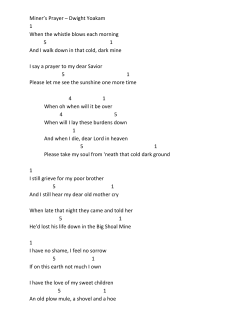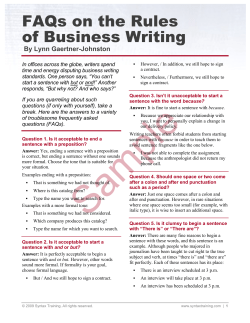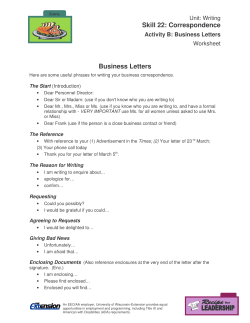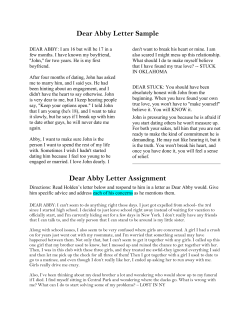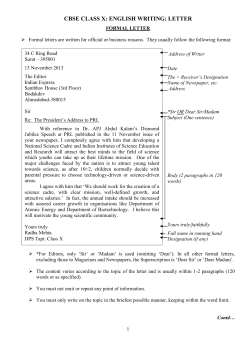
Official letter to Neven Mimica related to the problems and availabilty
Neven Mimica CAB-MIMICA-WEBPAGE@ec.europa.eu European Commission Rue de la Loi / Wetstraat 200 1049 Brussels Belgium 13 February 2015 Dear Commissioner Mimica, We would like once more to draw your attention to a structural problem – the distribution of Development Education and Awareness Raising (DEAR) grants. The current guidelines and rules related to the DEAR call for proposals are causing an unbalanced distribution of financial means towards civil society in Europe, which is resulting in a reduced impact of the EC’s DEAR programme. Moreover, we are surprised and concerned by news that in 2015, the European Year for Development, there will be no DEAR call. We, national development CSO platforms from the so-called EU13 member states, together with colleagues from national platforms from other member states and chairs of the CONCORD DARE Forum and Funding for Development and Relief (FDR) working group, strongly believe that current guidelines for the DEAR call are based on indirectly discriminating principles where one apparently neutral provision – the same guidelines and rules for all CSOs across the EU – results in administrative and capacity barriers for a majority of CSOs across the EU, especially within the EU13, to apply and access the grants. As the recent TRIALOG funding study1, which was sent to you earlier has shown, there is a very limited number of so called “smaller” CSOs within the EU13 that were able to access the grant. Even some national development CSO platforms are not in a position to apply or co-finance more than 10%. In this context what is considered a “small” CSO varies across the EU. What is perceived as small from a Brussels administrative perspective, might be considered large or significant from a local perspective. The existence and impact of “small” CSOs, which often have direct links to local communities and benefit from greater flexibility, is crucial for effective work on development in a number of EU countries. If we want European policies to have the best possible coverage, then organisations that are used to working with modest budgets must be given the support they deserve2. As the recent Eurobarometer3 clearly showed, a majority of people in EU13 countries do not think that tackling poverty in developing countries should be a national priority4, and personal engagement is also extremely low5, so it is evident that there is important DEAR work to be done. 1 TRIALOG studies on EU13 civil society participation in different European grants schemes over the last ten years, namely in Development Education and Awareness Raising, selected development cooperation projects in the Global South and projects in the area of humanitarian action, June-July 2014 http://www.trialog.or.at/images/doku/trialog_study_eu13_ec_dear_final.pdf 2 For example, the average Latvian NGO has an annual turnover of 20,000 EUR 3 http://ec.europa.eu/public_opinion/archives/ebs/ebs_421_en.pdf Inability to access EU funding is not just a problem for the majority of CSOs within the EU13, but also for many other CSOs all across Europe. A DEAR grant, although primarily focused on raising awareness among EU citizens on global issues, also strongly influences the development of CSOs working in the field of development education and development cooperation. We believe it is mutually beneficial, both for the Commission and the health of the CSO sector, to have diverse CSOs across Europe – both large and small – working on development issues. We see the role of the Commission as fostering an enabling environment for CSOs of all sizes without a financial bias in favour of large CSOs and CSO consortia. In fact the size of the consortia currently required is one of a number of criteria that is hindering accessibility and not contributing to quality DEAR projects across the EU. In the DEAR call there are enough finances to satisfy both approaches, and thus make the system work for a bigger proportion of development CSOs in Europe. Administrative concerns must not take priority over the substance of the work. For us it is crucial that within the DEAR grant scheme there is an opportunity for CSOs to apply for smaller grants. If the European Commission dedicated a proportion of the funds available to smaller projects, it should be possible to improve accessibility without increasing the administrative burden for the EC to unmanageable levels. We also urge the European Commission to reconsider the decision not to launch a DEAR call in 2015. Despite the additional funding linked to the European Year for Development, after two years with no DEAR call, a number of organisations will face a significant funding gap. In the course of the European Year for Development, which after all is focused on raising awareness among the general public, DEAR funding across Europe should be strengthened rather than diminished. We are happy that the Commission is open to working together to improve this situation and recognise the consultations that CONCORD is involved in, through the FDR working group and other bodies. We also congratulate the Commission on the conclusion of the recruitment of the DEAR Support Team. We hope that the team that was recruited contributes to an effective strengthening of the DEAR sector, building capacities at the CSOs and EC staff level and contributing to the increased quality of DEAR actions. We hope that the next DEAR call will open funding opportunities to a greater number of EU citizens actively working within CSOs. Continued partnership with the European Commission is crucial for us, and for a stronger civil society more broadly. We are ready to provide any additional clarifications. Sincerely, Gordan Bosanac, Croatian Platform for International Citizen Solidarity (CROSOL) Ventzislav Kirkov, Bulgarian Platform for International Development (BPID) Annagrace Messa, Cyprus Islandwide Development NGO Platform (CYINDEP) 4 5 Page 23 – all EU13 countries except Romania and Croatia are below EU average Page 47 – all EU13 countries except Cyprus and Malta are below EU average (Slovenia is equal to EU average) Pavel Přibyl, Czech Forum for Development Cooperation (FoRS) Piret Hirv, Estonian Roundtable for Development Cooperation (AKÜ) Tímea Gedeon, Hungarian Association of NGOs for Development and Humanitarian Aid (HAND) Inese Vaivare, Latvian Platform for Development Cooperation (LAPAS) Marta Čubajevaitė, National Non-Governmental Development Cooperation Organisations' Platform (Lithuanian NGDO Platform) Lina Kalibataite, Lithuanian Development Education and Awareness Raising Network (LITDEA) Roderick Agius, National Platform of Maltese NGDOs (SKOP) Jan Bazyl, Polish NGDO platform (Grupa Zagranica) Adela Rusu, Romanian NGDO Platform (FOND) Martina Bobulová, Slovak Non-governmental Development Platform (Platforma MVRO) Marjan Huč, Slovenian Global Action (SLOGA) Mari-Helene Kaber and Bobby McCormack – CONCORD DARE Forum Co-chairs Åsa Thomasson and Stijn de Lameillieure – CONCORD FDR Co-chairs Annalies Vilim, Austrian Platform for Development and Humanitarian Aid (Global Responsibility) Gérard Karlshausen, Belgian Platform of CONCORD Berit Asmussen, Danish NGDO Platform (Global Focus) Rilli Lappalainen, Finnish NGDO Platform (Kehys) Philippe Jahshan, French NGDO Platform (Coordination SUD) Fotis Vlachos, Hellenic Platform for Development NGOs (Greek National Platform) Hans Zomer, the Irish Association of Non-Governmental Development Organisations (Dóchas) Francesco Petrelli, Italian NGDO Platform (CONCORD Italia) Pedro Krupenski, Portuguese NGDO Platform (Plataforma Portuguesa das ONGD) Maite Serrano, Spanish NGDO Platform (Coordinadora de ONGD-España) Magnus Falklöf, CONCORD Sweden Ben Jackson, British NGDO platform (BOND)
© Copyright 2025
